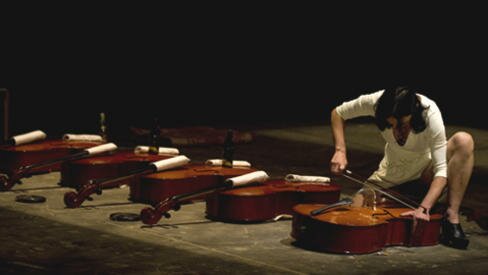
Te haré invencible con mi derrota is the gnomic title of Angélica Liddell’s deeply unsettling performance (at On the Boards tonight and Sunday, she’s taking Saturday to recuperate; tickets: $25). It means “I will make you invincible with my defeat,” although the performance may defeat you, if you have a low tolerance for someone drunkenly slicing into herself with razor blades, driving broken glass into her back, or piercing her fingers like a pin cushion, while you watch.
It’s not a show I thought I’d find myself arguing on behalf of, and yet here I am. The normally up-for-anything On the Boards audience sat in stunned silence as Liddell’s footsteps faded away, the door clanging shut behind her as the show ended. The stage was still lit in its stations of her via dolorosa: a BB rifle, a paint gun, a blowtorch, a topiary, a microwave, a painting, a chair, a collection of cellos, bread (now scattered), a wax hand sitting in a cooling pool of itself. After a long while, someone tried clapping again, and it caught on, raggedly, though not forcefully. It was like clapping for a crucifixion.
Here is the what. At 42, for mysterious reasons, Liddell spiraled into a very dark place. In the program notes, she tries to couch it as an unsettling recognition of aging, but it’s not just a mid-life mood swings. She wants to die (in the show, Liddell points to her head and cocks her finger, blows her brains out). Because the mind is a peculiar playground, she comes across the life story of British cellist Jacqueline du Pré, a virtuoso who was struck down by multiple sclerosis at that age. So, compare and contrast: Here is Liddell, perfectly healthy, but with a mind that wants to die; and there is du Pré, who wants to live, but with a body that is eating itself away.
Spain of cours is the natal place of mid-life crisis–at least as described in the soul-wracking doubt and despair of St. John of the Cross. There are people whose whole lives are fed by that inner flame of spiritual desire, and who, when it flickers and goes out, are plunged into a darkness that is inconceivable to those who have never experienced it. So it is in this sense that I “get” Liddell’s blood-letting–a willed mortification of the flesh, a gift for the absent god. There are other levels: She wishes to speak with the dead, with du Pré, to learn what death has taught her. That’s Greek, and ancient, the shedding of blood to call the dusty shades to you.
Your understanding of Liddell’s musings and ravings (in Spanish) may or may not be aided by the supratitles, as Liddell improvises, throwing the projectionist off. (Her text also differed from the titles OtB’s staff had prepared, and hadn’t been able to go over with the artist.) This kind of show leaves you grasping with half your brain for narrative to explain why someone is doing that to themselves (“If someone like that walked into the ER,” I heard from an acquaintance later, “we’d sedate them immediately).
So it’s important, and yet not, that Liddell-du Pré seems to be referencing the sufferings of Job, reacting with anger and contempt at the mealy-mouthed consolations of others, and howling Why? at the heavens. Why did I expect so much from life? she asks. But she isn’t going to get Job’s answer. (God blusters up, demanding to know who’s running the Universe, God or Job? Not Job? Right. STFU.) She’s left to drown in a pool of Why?, which is what you can clearly see, translated supratitles or no.
The attempted translation is of another sort. As a fellow attendee explained it, there first is du Pré’s suffering at the loss of her talent and, eventually, life, the stewing in bitterness, rage, and helplessness. Liddell translates this into her pain (her crisis), and then translates that to you with razors, broken glass, pins. You are the last book this can be written in, but you still have a say: You can identify with what you see, you can think, “I am so glad I am not in her place,” or you can reject it entirely. “She needs to develop a sense of humor,” someone said, leaving the theatre.
People return from the dead bound to tell others what they have learned. It’s there in Liddell’s title, but you don’t comprehend “invincible” until you see the show’s via negativa, an aria of “unsuccessfully coping” that leaves you breathless, as if in the presence of something superhuman. Liddell rants along with music she can’t play, pincushions du Pré’s unfeeling fingertips, gathers up with one hand white cords tied to cellos, as if her tendons have pulled free to some grotesque length. Nothing is all right, every pain normally hidden in the body is splayed on the floor in front of you, Liddell’s half-naked, rangy body covered with a blood-spotted tissue. She hauls herself up with rancor, spitting at everything she’s lost. For that moment, she’s untouchable.